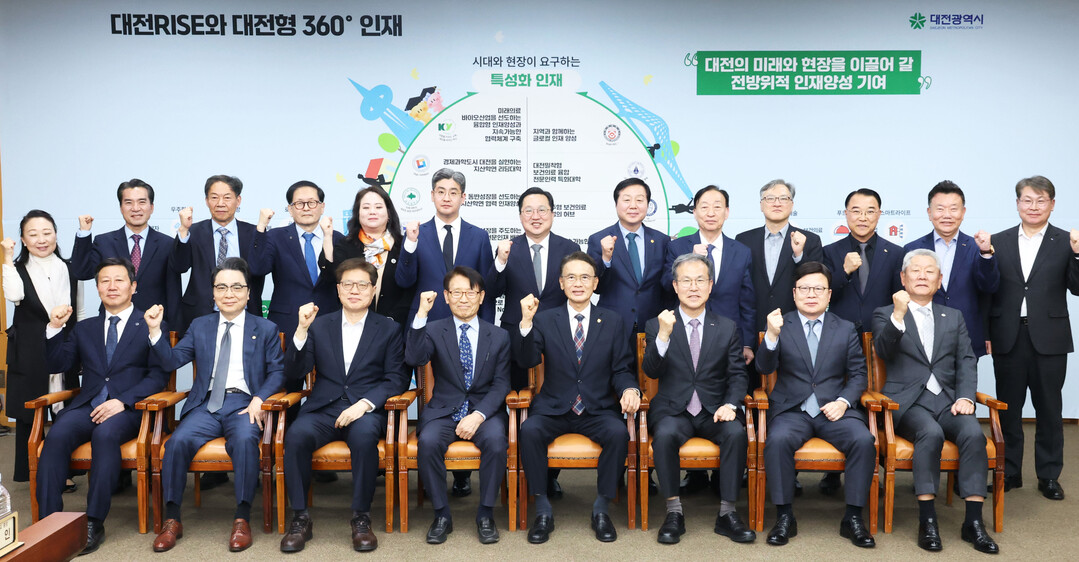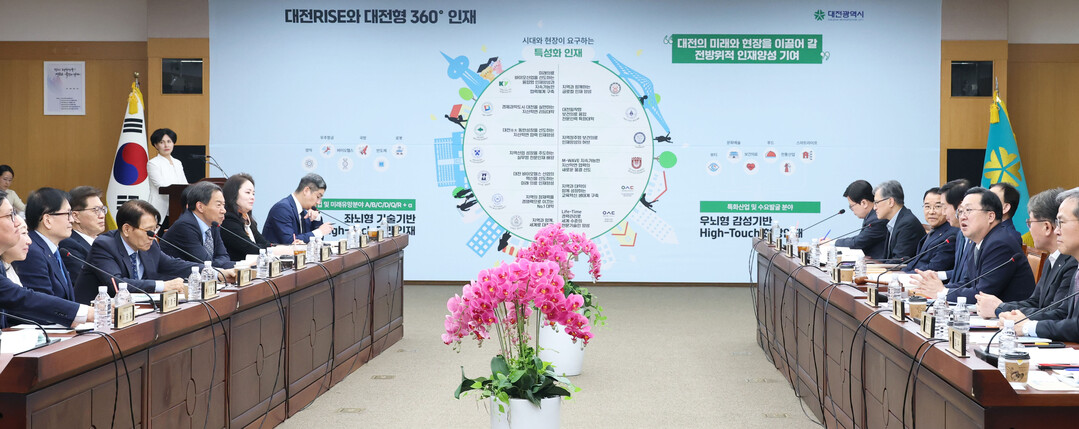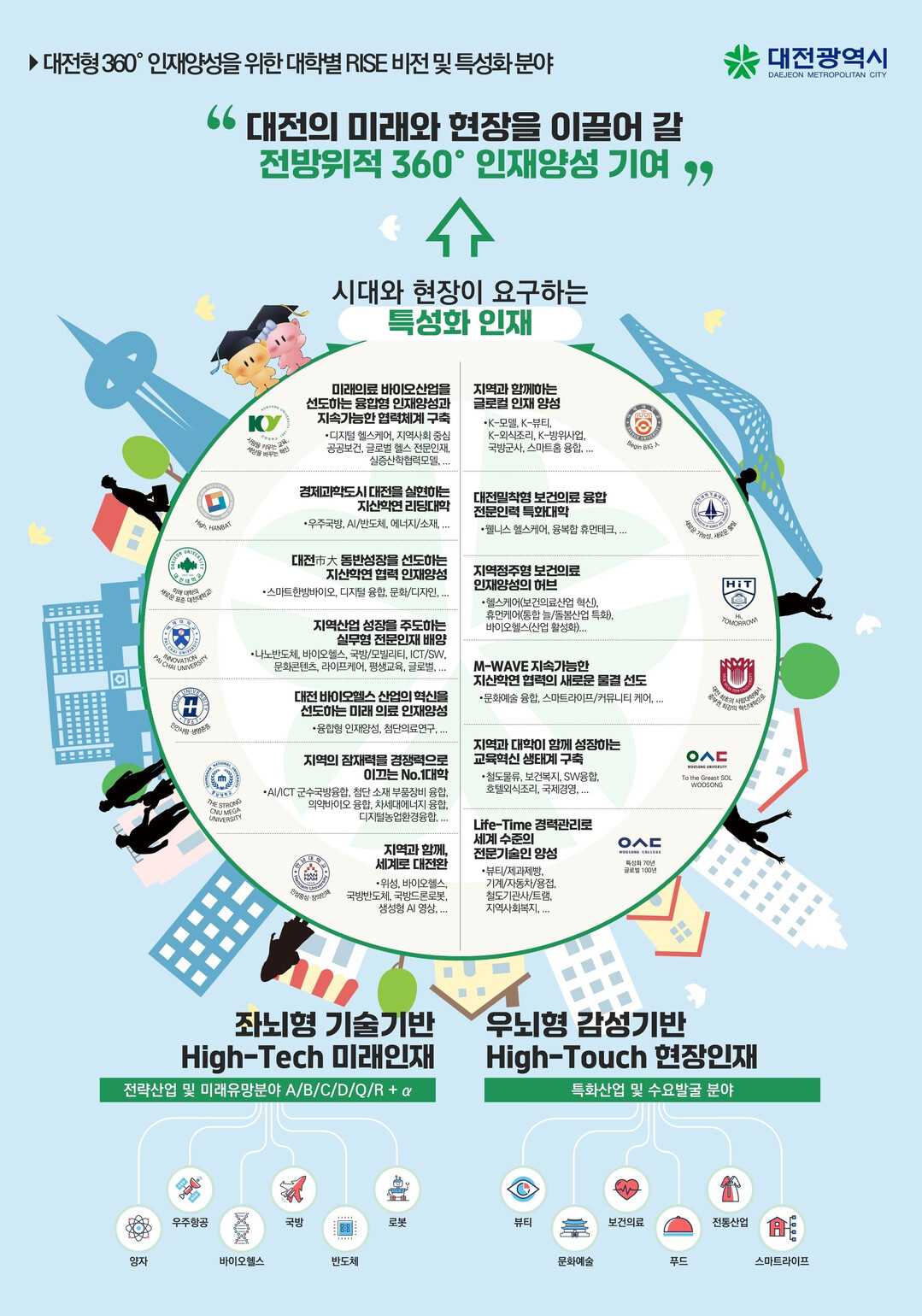
Daejeon Metropolitan City has officially initiated its Regional Innovation System & Ecosystem (RISE) project, a substantial undertaking with a total budget of ₩65.5 billion, and has finalized the selection of 13 participating universities. This ambitious endeavor marks a significant shift towards a locally-driven university support system, aiming to foster mutual growth between regional industries and universities through higher education innovation.
On May 2nd, the Daejeon Metropolitan Government convened the ‘Daejeon RISE Committee,’ co-chaired by Mayor Lee Jang-woo and Chungnam National University President Kim Jeong-kyum, to deliberate and approve the results of the university selection process. The project, which commenced with a call for proposals from local universities in March, underwent rigorous evaluation in early April. This included written assessments, in-person presentations, and a comprehensive overall evaluation, culminating in the selection of universities to execute five key projects encompassing 12 specific tasks. The allocation of project funds was determined based on the evaluation grades of the selected institutions. Notably, the ‘DSC Shared University’ initiative, a designated task, received a separate feasibility assessment and was allocated ₩1.18 billion.
The 13 universities selected to participate are: Keonyang University (Medical Campus), Hanbat National University, Daeduk University, Daejeon Institute of Science and Technology, Daejeon University, Daejeon Health Institute of Technology, Mokwon University, Pai Chai University, Woosong University, Woosong College, Eulji University, Chungnam National University, and Hannam University.
These universities will collaborate with a diverse range of stakeholders, including government-funded research institutes, regional innovation agencies, local businesses, and the Korea Polytechnic IV College, to implement five core projects designed to drive higher education innovation and regional synergy.
The first project, ‘Region-Leading Specialized University Education,’ aims to cultivate well-rounded talent capable of leading Daejeon's future in strategic industries, promising emerging fields, and specialized, demand-driven sectors. With an investment of over ₩15.4 billion (24% of the total project budget) distributed among all 13 universities, this initiative will focus on restructuring academic programs and operating industry-academia-research linked customized curricula to enhance university competitiveness.
The second project, ‘Region-Anchored Employment and Entrepreneurship Promotion,’ prioritizes boosting local employment and entrepreneurial activities to increase the regional retention rate of graduates. Twelve universities, including Daejeon University, will implement this project with a budget of ₩19.2 billion (30% of the total). Key activities include supporting career exploration programs with local business participation, entrepreneurship education linked to regional industries, and fostering technology and local-based startups.
The third project, ‘Sustainable Industry-Academia-Research Cooperation Advancement,’ targets enhancing regional productivity. Hanbat National University and all other participating universities will receive over ₩17.7 billion (27% of the total budget) for this endeavor. Core strategies involve nurturing research talent in collaboration with government-funded research institutes, promoting technology commercialization, operating joint education systems between universities, and leveraging university-owned infrastructure for industry-academia cooperation.
Specifically, Chungnam National University, Hanbat National University, Hannam University, and three other universities will undertake the ‘Government-Funded Research Institute Research Cooperation’ task, a flagship initiative of Daejeon’s RISE project, to establish a regional innovation model integrating talent development, research and development, and commercialization.
The fourth project, ‘Lifelong Growth-Oriented Vocational and Continuing Education Strengthening,’ aims to establish a lifelong learning system that adapts to technological advancements and societal changes. Pai Chai University and eight other institutions will receive ₩5.1 billion (8% of the total budget) to operate job competency enhancement programs for incumbent and re-employment workers, as well as lifelong education courses for citizens.
The fifth project, ‘RISE-Promoting Resolution of Local Issues and Creation of a Fun City,’ focuses on strengthening Daejeon’s global capabilities and resolving local challenges through resident-participatory initiatives. Twelve universities, including Woosong University, will participate with a budget of ₩6.9 billion (11% of the total). Key activities include attracting and supporting international students, operating living labs to address local issues, and developing cultural and artistic content and festivals.
To systematically manage the outcomes of the RISE project, Daejeon City has established three autonomous performance indicators: the ‘Daejeon 360-Degree Talent Development Education Innovation Index (D1),’ the ‘Industry-Academia-Research Cooperation Index (D2),’ and the ‘Regional Vitality Index (D3).’ By 2029, the city plans to integrate these indicators into the ‘Daejeon RISE Ecosystem Index (D-Triple)’ to assess the virtuous cycle of outcomes among local governments, industries, universities, and research institutions, thereby fostering a sustainable foundation for regional innovation.
Daejeon City will notify each university of the selection results and proceed with an objection process. Subsequently, memorandums of understanding (MOUs) are scheduled to be signed between the Daejeon RISE Center and the participating universities in May.
Mayor Lee Jang-woo emphasized, “Earlier this year, we achieved a significant outcome by securing an additional ₩12.4 billion in national funding through the Ministry of Education’s RISE plan evaluation. Moving forward, we will continue to foster horizontal collaboration among local governments, universities, industries, and research institutions to achieve educational innovation, create regional vitality, and drive sustainable growth together.”
Further Information and Context:
To provide a more comprehensive picture, additional research reveals the following aspects that enrich the understanding of Daejeon's RISE initiative:
National Context of RISE: The RISE project is a nationwide strategy initiated by the South Korean Ministry of Education to decentralize authority over higher education funding and empower local governments to design and implement university support systems tailored to their regional needs and strategic industries. This shift aims to overcome the limitations of a centrally controlled system and foster greater synergy between universities and their local ecosystems.
Emphasis on Regional Strategic Industries: Daejeon, known as a hub for science and technology, is strategically focusing its RISE projects on nurturing talent and innovation in key sectors such as biotechnology, artificial intelligence, advanced materials, and aerospace. The involvement of government-funded research institutes like the Korea Advanced Institute of Science and Technology (KAIST) and the Electronics and Telecommunications Research Institute (ETRI), though 1 not directly listed as participating universities in this initial selection, is expected to be significant through collaborative projects.
The Role of the DSC Shared University: The ‘DSC (Daejeon-Sejong-Chungnam) Shared University’ is a collaborative platform involving universities across the Daejeon, Sejong, and South Chungcheong provinces. The allocated budget of ₩1.18 billion suggests initial funding for joint programs and resource sharing among these institutions, aiming to enhance educational opportunities and regional collaboration beyond Daejeon's immediate boundaries.
Evaluation Criteria: While the article mentions written and in-person evaluations, the specific criteria likely included factors such as the alignment of university programs with regional industrial needs, the strength of their industry and research collaborations, their plans for innovation in teaching and learning, their commitment to student career development and local employment, and their proposals for contributing to the resolution of local challenges.
Long-Term Vision: The establishment of the ‘Daejeon RISE Ecosystem Index (D-Triple)’ signifies a long-term commitment to monitoring and evaluating the impact of the RISE project on the region's innovation ecosystem. This data-driven approach will be crucial for making adjustments and ensuring the sustainability of the initiative.
Potential Challenges and Opportunities: While the RISE project holds immense potential, challenges may arise in coordinating the diverse activities of 13 universities and numerous partner organizations. Effective communication, clear roles and responsibilities, and robust evaluation mechanisms will be crucial for success. The opportunity lies in creating a vibrant innovation ecosystem that attracts talent, fosters entrepreneurship, and drives economic growth in the Daejeon region.
By incorporating these additional details, the significance and potential impact of Daejeon's RISE project become even clearer, highlighting its role within the broader national strategy for higher education reform and regional development.


[Copyright (c) Global Economic Times. All Rights Reserved.]






























